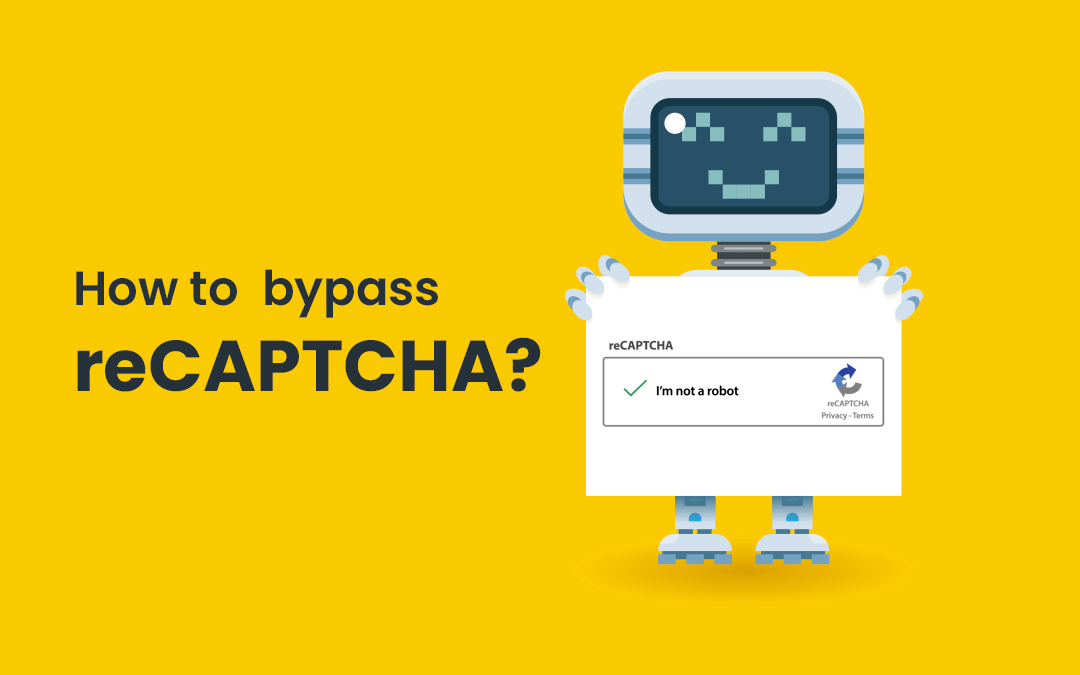
What are reCAPTCHAs?
reCAPTCHAs are a type of challenge-response test used to determine whether the user is a human or an automated bot. Developed by Google, they are designed to prevent automated software from performing actions on websites that would otherwise be susceptible to abuse, such as automated scraping, spamming, or brute-force attacks.
How Does CAPTCHA Block You While Web Scraping
CAPTCHAs, especially reCAPTCHAs, detect and block automated scraping by requiring users to complete a challenge that is easy for humans but difficult for bots. This includes recognizing images, solving puzzles, or interacting with certain elements. These challenges are often triggered by suspicious behavior, such as rapid, repeated requests from the same IP address or unusual browser fingerprinting data.
How to Bypass CAPTCHA While Web Scraping
Bypassing CAPTCHAs while scraping can be challenging but possible using the following methods:
Rotate IPs
Rotating IPs can help avoid triggering CAPTCHAs by simulating requests from different users. This method reduces the chances of being flagged as a bot by distributing requests across multiple IP addresses.
Use a CAPTCHA Resolver
Using a CAPTCHA resolver service like NextCaptcha can automate solving CAPTCHA challenges. These services typically provide an API that integrates with your scraping tool, allowing you to bypass reCAPTCHA v2, reCAPTCHA v3, and other CAPTCHA variants in real time.
When a CAPTCHA-solving service receives a request to solve a CAPTCHA, it transfers it to an AI worker who solves the puzzle and sends its solution to the solver service. The service then returns the CAPTCHA answer to a scraper, which uses it to solve the CAPTCHA challenge on a target web page.
While that appears to be an easy fix and it's cheaper and faster, it works with some reCAPTCHA types.

Here is a Python script demonstrating this process:
import requests
# Your NextCaptcha API key
api_key = 'YOUR_NEXTCAPTCHA_API_KEY'
site_key = '6LcAbwIqAAAAAJvVAhSSJ8qzYsujc7kn1knmSgQX'
page_url = 'https://nextcaptcha.com/'
# Step 1: Send a request to NextCaptcha to solve the reCAPTCHA
captcha_request_url = 'https://api.nextcaptcha.com/createTask'
payload = {
'clientKey': api_key,
'task': {
'type': 'RecaptchaV3TaskProxyless',
'websiteURL': page_url,
'websiteKey': site_key,
'pageAction': 'submit'
}
}
response = requests.post(captcha_request_url, data=payload)
if response.status_code != 200:
print('Failed to send request to NextCaptcha')
exit()
response_data = response.json()
captcha_id = response_data.get('taskId')
# Step 2: Retrieve the solved token from NextCaptcha
retrieve_url = 'https://api.nextcaptcha.com/getTaskResult'
params = {
'clientKey': api_key,
'taskId': captcha_id
}
solution = None
while solution is None:
time.sleep(1) # Wait a few seconds before checking again
response = requests.post('https://api.nextcaptcha.com/getTaskResult', data={
"clientKey": "api key",
"taskId": request_id
})
if response.json().get('errorId') == 0:
solution = response.json().get('solution')
# The reCAPTCHA token
recaptcha_token = solution["gRecaptchaResponse"]
print(f'Successfully retrieved token: {recaptcha_token}')
# Step 3: Use the token in the verify API endpoint
verify_url = 'https://next.nextcaptcha.com/api/captcha-demo/recaptcha_enterprise/verify'
verify_payload = {
'siteKey': site_key,
'gRecaptchaResponse': token,
'action': 'submit'
}
verify_response = requests.post(verify_url, json=verify_payload)
if verify_response.status_code == 200:
print('Verification response:', verify_response.json())
else:
print('Failed to verify token')
Summary
Bypassing reCAPTCHA during web scraping in 2024 requires a combination of techniques, including rotating IPs and leveraging CAPTCHA resolver services such as NextCaptcha captcha solver. While these methods can be effective, it’s important to consider the legal implications and ensure that your actions align with the ethical guidelines.
 FAQs
FAQs
Bypassing CAPTCHAs is a gray area legally and ethically. While using CAPTCHA solvers can be seen as circumventing protective measures, it may violate terms of service or local regulations. It’s crucial to consult legal advice before engaging in activities that involve bypassing CAPTCHAs.
Yes, it is technically possible to bypass CAPTCHAs while scraping using methods like rotating IPs and using CAPTCHA resolver services. However, careful implementation is required to avoid detection and ensure that your actions comply with legal and ethical standards.
Disclaimer: The information provided in this article is for educational and informational purposes only. The use of CAPTCHA bypassing techniques, including the use of CAPTCHA resolver services, may violate the terms of service of websites and could potentially result in legal consequences. We do not endorse or encourage the illegal or unethical use of web scraping methods to circumvent security measures like reCAPTCHA. Before implementing any of the techniques discussed, it is important to consult legal counsel to ensure compliance with applicable laws and website policies. Use these techniques responsibly and within the bounds of the law.
Share this post
Leave a comment
All comments are moderated. Spammy and bot submitted comments are deleted. Please submit the comments that are helpful to others, and we'll approve your comments. A comment that includes outbound link will only be approved if the content is relevant to the topic, and has some value to our readers.

Comments (0)
No comment